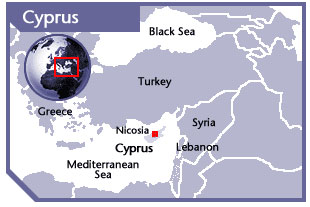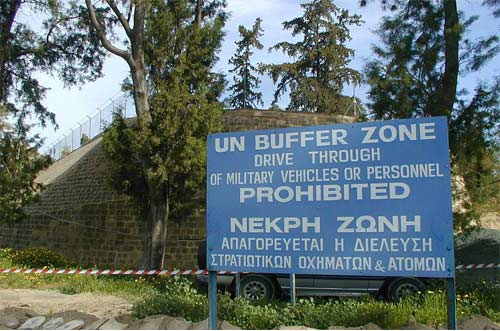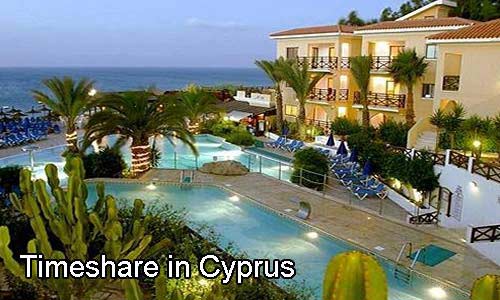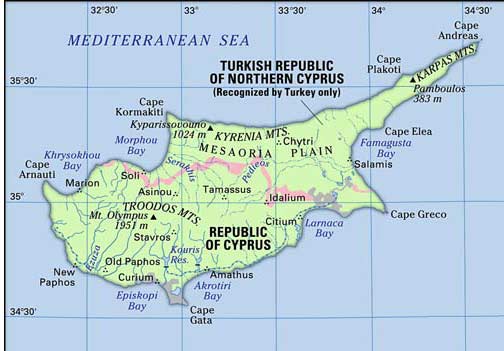

The UK doesnt recognise the self-declared “Turkish Republic of Northern Cyprus” (“TRNC”) in the northern section of the island.
The “TRNC” isnt internationally recognised, only by Turkey. Throughout this document, the “TRNC” is either referred to as such, or as" the northern section of cyprus."
Missing People
There are large numbers of people who are still missing from both communities in Cyprus after the events of the 1960s and 1970s. The UK government is pleased by the progress that is currently being made by the Committee for Missing Persons in Cyprus in thetaask of recovery of identification of the missing persons. The U.K. are also encouraged by the recent increase in activity surrounding the search for missing persons on the island and the teamwork approach that has been taken by the 2 communities.
Under the terms of the International Convention on Civil Aviation establisd in 1944 (Chicago Convention), flights can only operate legally to the international airports designated by the Republic of Cyprus. There is actualy no such airports in the northern section of cyprus. So, Under these circumstances, the UK Government decided that the approval of direct flights by any airline from the UK to the northern section of Cyprus wouldnt be compatible with the UK's international obligations under the Chicago Convention, and also withcurrent UK domestic legal obligations.

It divides the island from the coast north west of Morphou through Nicosia to Famagusta. It is possible to go to the northern section of Cyprus using any of the official crossing points located at/on the 'Green Line'. There are no restrictions on how long you are allowed to stay in the northern section of cyprus if you go over.
The crossing points are located as follows:
You may take a car through the checkpoints, but not at at Ledra Palace or Ledra Street, which are only for pedestrians . If you are planning to take a car through the checkpoints,be sure to check first with the hire car company that they are happy for you to do this, and ask if you need to purchase any additional insurance, this is available at the checkpoint, before you cross.
When going through the crossing points you will need to show your passport. A separate sheet will be presented for completion on which you will have to enter your passport details in order to go through the crossing point.
Before you can purchase property anywhere in Cyprus you are strongly advised to seek qualified legal advice from a source that is totally independent from the seller.
Property dilemas are very closely linked to the precarious political situation. There are a number of possible practical, financial and legal implications if you are considering buying property in the northern section of Cyprus. These do relate to the non-recognition of the "Turkish Republic of Northern Cyprus".
Compliations can arise from:
Separately, potential buyers should also try to ensure that they are aware completely of the rules specificaly imposed by the administration on foreign buyers of property in the northern section of Cyprus, including any requirements to obtain consent from the holders of the authentic title deeds to the transfer of property.
Under this amendment, purchasing, selling, renting, promoting or mortgaging a property without the permission of the legal owner (the person whose ownership is registered with the Republic of Cyprus Land Registry, including Greek Cypriots who were displaced from the northern section of Cyprus in 1974), is a criminal offence. This applies also to agreeing to sell, purchase or rent any property without the legal owner’s permission. The maximum prison sentence is 7 years. Also, the changes to this law states that any efforts to undertake such a transaction is a criminal offence and may result in a prison sentence of up to 5 years. This law isn't retrospective, so it will not criminalise transactions that took place before the 20th of October 2006. Documents relating to the buying of property in the northern section of Cyprus will be presumed by the Cypriot authorities to relate to the illegal transfer of Greek Cypriot property and can be subject to seizure when crossing the Green Line. Anyone found in possession of these documents can be asked to make a statement to the Cypriot authorities and could face criminal charges under the 20th of October 2006 amendment to the law. The full implications of this legislation isnt yet clear. Any enquiries in regards to the scope of the legilation and its implications may be made to the Cyprus High Commissiom in London.
Time share/property salespersons tout for their business through out Cyprus, especially in and around the Paphos area. Be sure to read the fine print very carefully before signing anything and seek qualified legal advice before agreeing any kind of contract. Under Cypriot law you are entitled to a 15-day “cooling off” period during which, if you do happen to change your mind, you can legaly receive a full refund of any money paid.

The UK High Commission in Nicosia has produced some frequently asked questions and answers about property on their web-site. They can be accessed by clicking here
Britain took over the administration of Cyprus from Turkey Under the 1878 Convention of Defensive Alliance established between Britain and Turkey at that time. Turkey retained formal sovereignty. In 1914, Britain annexed Cyprus when Turkey entered the First World War on the side of the Central Powers,Turkey recognised British sovereignty under the terms of the 1923 Treaty of Lausanne and then Cyprus became a Colony of the Crown in 1925.
Greece, Turkey and the UK became joint Guarantor Powers of the Republic through the Treaty of Guarantee of that year. However tensions between the Greek and Turkish Cypriots esculated and resulted in serious intercommunal fighting in December 1963. From then until 1974 there were some outbreaks of further violence and the Turkish Cypriot minority retreated into small enclaves. A UN force was put in place in 1964.
The northern section of cyprus saw the arrival of Turkish troops In 1974 following a coup on the island by extremists against the then elected President, which was backed by the military junta in power at the time in Greece. The island has since been effectively partitioned and approximately 36% of the territory of the Republic isn't under the control of the Government. The 'Green Line' buffer zone became established and continues to be patrolled by United Nations troops. The island remains divided by this line. Successive UN Secretaries-General have made efforts to secure a settlement that could end the division of Cyprus through intercommunal talks.
Cyprus enjoys very good relations with Greece and co-operates very closely on a whole range of issues. As Turkey doesn’t recognise the Republic of Cyprus, relations with Turkey are very much more difficult and strained. The continued division of Cyprus and the need for a politcal solution impacts significantly on Cyprus’ relations with its neighbours and beyond.
At Copenhagen European Council in December 2002 , Cyprus was then formally invited to join the EU. Cyprus signed the Treaty of Accession on 16 April 2004, and thus became a full member of the EU on 1 May 2004. The EU acquis (the EU's body of law) is suspended in the northern section of Cyprus) and, as such, Turkish Cypriots do not get the benefits of the EU inclusion or share the burden of being part of the EU.
the UK and Cyprus have a long-standing and wide-ranging bilateral relationship, based on historical ties. The UK has been fully supportive of efforts to achieve a resolve of the Cyprus problem. Over 300,000 Greek and Turkish Cypriots live permanently in the UK and over 8,000 students from Cyprus go to the UK annually to take up a full time education. Many British citizens have chosen to retire to Cyprus and many thousands also re-visit the island every year.
Cyprus is the 3rd largest island in the Mediterranean sea, situated 300km north of Egypt and 60km south of Turkey. It has 2 mountain ranges– the Troodos massif (Mt Olympus 1,953 m) and In the central and south-western sections of the island the Pentadaktylos range (max height 1,042 m). along the north coast and.Between the 2 ranges lies the plain of Messaoria. The Climate is typicaly Mediterranean – hot, dry summers and changeable winters.

The Sovereign Base Areas (SBAs) are sovereign British territory and this covers approx 98 square miles of the island of Cyprus. The SBAs are purely military . They are run by the SBA Administration and have their own legislation, police force and courts. They are very closely linked with the Republic of Cyprus with whom they are in a customs and currency union.
Traditionally the UK has been the single most significant trading partner with Cyprus. The value of UK exports (visible goods) to Cyprus in 2019 amounted to GB £1.2 billion and Cyprus exports (visible goods) to UK in 2020 reached over GB £177.46 million.
Politics on both sides of the island are dominated by the ongoing division of Cyprus. There have been many initiatives since 1974 to try to reach a settlement of the Cyprus problem. All of these for one reason or another have failed miserably. Most recently, on 24 April 2004, the UN Secretary General’s Comprehensive Settlement Proposals, known as the “Annan Plan”, failed when put to separate and simultaneous referenda on both sides of the island. In the referenda, Turkish Cypriots voted in favour of the plan by65% eand the Greek Cypriots rejected it by a 3 to 1 majority (76%).
Unfortunately, all efforts since the failure of the Annan Plan proved unproductive until the Cypriot Presidential elections in February 2008. After then, the Republic of Cyprus President Christofias and leader of the Turkish Cypriot community Mr Talat has met several times and made some real progress towards full settlement negotiations. Following their meeting on 25 July 2008, the two leaders have announced that fully fledged negoatiations will start on 3 September. The UK Government continues to support all efforts to achieve a comprehensive solution to the division of Cyprus.
24 April 2004 - Referendums held on both sides of the island. The referendum in the Turkish Cypriot community is carried by a large majority (65%actualy voted yes); But in the Greek Cypriot community the settlement proposals are opposed by a large majority of 76% voting no. Accordingly the Annan Plan – which was designed to be self-executing in time for a reunited island to enter the EU on 1 May – is null and void. (The UK’s offer of territory from the Sovereign Base Areas, which was an integral part of the Plan, is also null and void.)
26 April 2004 - the EU’s General Affairs and External Relations Council expresses its strong dissapointment that the accession to the EU of a united Cyprus would not now be happening on 1 May, and its determination to ensure the people of Cyprus will soon get their shared destiny as citizens of a united Cyprus in the EU. The Council also expressed its determination to put an end to the isolation of the Turkish Cypriot community and to encourage their economic development sor to facilitate the reunification of Cyprus.
1 May 2004 – Cyprus joins the EU as a divided island. The EU acquis (EU body of law) is suspended in the northern section of cyprus.
July 2004 - The Commission presents 2 draft regulations to encourage an end the isolation of Turkish Cypriots: An Aid Regulation to give 258 million Euros of aid to the northern section of cyprus and a Direct Trade Regulation.
17 December 2004 – The European Council agrees to begin accession negotiations with Turkey on 3 October 2005. It is expecting that the process of EU accession for Turkey will encourage and facilitate the renewal of settlement negotiations on Cyprus.
3 October 2005 - The EU officialy opens accession negotiations with Turkey. Progress towards a real comprehensive settlement in Cyprus is to be an important factor in Turkey's accession negotiations.
24-26 January 2006 – The Foreign Secretary visits Cyprus and is met by Foreign Minister Iacovou and Mehmet Ali Talat the leader of the Turkish Cypriot community, before he travelled on to Turkey and Greece for further talks.
27 February 2006 – EU approves an aid regulation, allocating 139 million Eurosof financial aid for the northern section of cyprus.
8 July 2006 – UN Under Secretary General Gambari reaches agreement with the leaders of the Greek Cypriot and Turkish Cypriot communities to start talks on the day-to-day issues, substantive settlement issues and confidence building initiatives. These talks are intended to lead towards a renewal of full settlement negotiations, but disagreements on the procedure to be followed continue to prevent the process from starting as yet.
15 November 2006 – Gambari agrees a process with leaders of Greek Cypriot and Turkish Cypriot communities to implement the 8th July agreement.
11 December 2006 – EU Foreign Ministers reach a decision to suspend the opening of 8 chapters of Turkey’s EU Accession negotiations, following Turkey’s failure to meet its obligations under the Ankara Agreement Protocol to open its ports to Republic of Cyprus shipping.
15 June 2007 – The UN Security Council has noted with concern the lack of progress on “the 8 July process”. In a unanimously adopted resolution (extending the mandate of the UN security force in Cyprus), the Council calls upon all the parties to immediately engage constructively with the United Nations efforts and demonstrate a measurable progress sor to allow fully fledged negotiations to begin, and to cease mutual recriminations. They reaffirm that the current status quo is unacceptable, that time isn't on the side of a settlement, and that negotiations on a final political solution to the Cyprus problem have been unobtainable for too long.
24 February 2008 – President Christofias elected President of Cyprus.
21 March 2008 – President Christofias and Turkish Cypriot leader Mr Talat meet under UN auspices and agreed to launch a new settlement process. They agreed that fully fledged negotiation should begin within three months, and that these negotiations would be preceded by a preparatory period in which technical committees and working groups, made up of Cypriots from both communities, would take a close look at the range of issues concerned with the re-unification of Cyprus. Both the leaders also agreed to open the Ledra Street crossing as a confidence building measure immediately.
03 April 2008 – Ledra Street crossing of the ‘Green Line’ is re-opened. The crossing had been closed for the preceding 44 years.
23 May 2008 – The leaders of the Greek Cypriot and Turkish Cypriot communitieshave met again and have re-affirmed their commitment to a bi-zonal, bi-communal federation with a political equality.
20 June 2008 – The leaders of the two communities have announced a further six confidence building measures as a result of the work of the technical committees. These measures will include environmental, health, waste-management and cultural heritage projects.
25 July 2008 – The leaders of the two communities met and announced that full direct settlement negotiations will begin on 03 September. They also announced a 16 stage confidence building program on matters ranging from the environment, cultural heritage, crisis management and crime.
2020 - Northern Cypriot constitutional referendum
A constitutional referendum was held in Northern Cyprus on 11 October 2020 alongside the first round of presidential elections. The proposed amendment would increase membership of the Supreme Court from eight to a maximum of sixteen. The amendment was rejected by 50.13% of voters.
The President is elected by a popular vote for a 5-year term of office. If no one candidate receives over 50% of the vote in the first round of voting,then the 2 candidates with the greatest number of votes go through to a second head-to-head round.
The President is both the Head of State and leader of the islands Government. He appoints the Council of Ministers, the cabinet of the Republic of Cyprus.
2013 election: Nicos Anastasiades Leader of the Democratic Rally is elected as president of the republic of Cyprus.
The most recent presidential elections were held in Cyprus on 28 January 2018. No candidate received a majority of the vote in the first round, and so a run-off was held on 4 February between the top two candidates, President Nicos Anastasiades of the Democratic Rally (DISY) and Stavros Malas of the Progressive Party of Working People. Anastasiades emerged as the winner with 55.99% of the vote

For Nissi Golen Sands and Nissi 3, contact Antony Ross
For Skaros, please contact George Atzio
+44 7737 540 170. WhatsApp.
+357 99 472 419 WhatsApp
